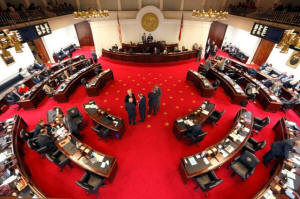|
Bathroom law battles loom in more states
after North Carolina controversy
 Send a link to a friend
Send a link to a friend
 [December 23, 2016]
By Jon Herskovitz [December 23, 2016]
By Jon Herskovitz
AUSTIN, Texas (Reuters) - The storm over
legislation seen as targeting transgender people is set to intensify in
2017 with several U.S. states proposing measures similar to a bathroom
restriction statute in North Carolina that has prompted protests,
lawsuits and economic boycotts.
Four states have legislation limiting transgender bathroom rights that
will be on the agenda when lawmakers convene next year, and Republican
leaders in other states have said more such bills will be filed soon.
North Carolina legislators, in a one-day special session on Wednesday,
had widely been expected to repeal their law, which requires people to
use the bathroom of their birth gender, but the effort fell apart.
Bathroom legislation has become a wedge issue for Republicans, pitting
the party's pro-business branch against social conservatives who have
rallied around the measures and see them as protecting common-sense
values, political scientists have said.
"A Republican may want to avoid it altogether," Mark Jones, a political
science professor at Rice University in Houston, said of the issue.
"They may know that it can bad for the state but they also know that
voting against it can be bad for their political career."

A Republican worried about a primary election, where social conservative
voters can be a decisive factor, might favor such legislation. A
Republican in a general election, where moderates play a bigger role,
knows the negative economic ramifications are too great to ignore, he
said.
Democrats have mostly been united in opposition to the legislation,
which opponents see as discriminatory against the lesbian, gay, bisexual
and transgender community.
The four states where bathroom access bills have been filed are Alabama,
Missouri, South Carolina and Washington, according to the National
Conference of State Legislatures, which tracks legislation at the state
level.
BATHROOM BILL PRIORITY
In Texas, the most populous Republican-controlled state, Republican
Lieutenant Governor Dan Patrick, a Christian conservative who guides the
legislative agenda in the state Senate, has said a bathroom bill will be
a priority.
"Legislation like this is essential to protect the safety and privacy of
women and girls and is simple common sense and common decency," Patrick
said in a statement on Thursday.
In March, North Carolina's law made it the first state to bar
transgender people from using public restrooms that match their gender
identity and put it at forefront in the U.S. battleground over LGBT
rights.
[to top of second column] |

Lawmakers confer during a negotiations on the floor of North
Carolina's State Senate chamber as they meet to consider repealing
the controversial HB 2 law limiting bathroom access for transgender
people in Raleigh, North Carolina, U.S. December 21, 2016.
REUTERS/Jonathan Drake

Fallout from the law hit the state's economy and rankled its
politics. In the nine months since it passed, the law has been
blamed by opponents for hundreds of millions of dollars in economic
losses and the relocation of conventions and major sports events.
While the total financial impact is unknown, some estimates suggest
the state has lost more than $600 million due to the legislation,
Forbes reported last month.
Republican Governor Pat McCrory narrowly lost a re-election bid in
November, with many viewing the vote as a referendum on the law.
A one-day special legislative session called by McCrory to implement
what appeared be a deal to repeal the law ended abruptly on
Wednesday with the state Senate voting against abolishing the
measure.
Democratic Senator Jeff Jackson said Republicans had reneged on a
deal to bring the repeal to a floor vote with no strings attached.
North Carolina's bathroom law has hurt the state's efforts to sell
itself as a progressive beacon in the U.S. South, said Karl
Campbell, a historian at Appalachian State University in Boone,
North Carolina.
Since the early 1990s, the state has spent heavily on schools and
infrastructure and sought investment from business, he said. Now,
its biggest city, Charlotte, is a U.S. banking hub and the state
hosts many multinational companies.
"This has been a jolt and it's beyond culture wars," Campbell said.
"It has to do with the state's image of itself. There really is a
deep divide now."
(Reporting and writing by Jon Herskovitz; Additional reporting by
David Ingram in New York and Letitia Stein in Tampa, Florida;
Editing by Bill Trott)
[© 2016 Thomson Reuters. All rights
reserved.]
Copyright 2016 Reuters. All rights reserved. This material may not be published,
broadcast, rewritten or redistributed.
 |